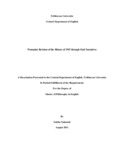Please use this identifier to cite or link to this item:
https://elibrary.tucl.edu.np/handle/123456789/2837Full metadata record
| DC Field | Value | Language |
|---|---|---|
| dc.contributor.author | Nakarmi, Sabita | |
| dc.date.accessioned | 2018-12-12T06:06:49Z | |
| dc.date.accessioned | 2021-07-23T04:22:25Z | - |
| dc.date.available | 2018-12-12T06:06:49Z | |
| dc.date.available | 2021-07-23T04:22:25Z | - |
| dc.date.issued | 2011 | |
| dc.identifier.uri | http://elibrary.tucl.edu.np/handle/123456789/2837 | - |
| dc.description.abstract | This dissertation concentrates on Ritu Menon and Kamla Bhasin‘s Border and Boundaries: Women in India‟s Partition; Urvashi Butalia‘s The Other Side of Silence: Voices from the Partition of India; and Meenakshi Verma‘s Aftermath: An Oral History of Violence that present a radically alternative understanding of partition violence through the personal narratives of female partition victims and survivors. They posit the women -- the gendered subaltern -- in the subject position letting them to speak for themselves and keeping them at the centre. Women were the innocent victims of the cataclysmic partition violence in 1947 as the men of one community physically exploited the women of other community in order to breach the manhood of the latter. Women were victimized in multiple ways—in abduction, rape, suicide, conversion, rehabilitation, abortion, migration and alienation. Their bodies were a site for the game of revenge and retaliation of men. In fact, women, their victimization and their death were the pretensions to hide the effeminated manhood of patriarchy. Notwithstanding, the national history silences the voices and representation of women‘s pain and experience as it only glorifies the birth of two independent states. However, the personal narratives that Menon and Bhasin, Butalia and Verma have chronicled, work through subalternist feminist subjectivity to recall the acts of violence against individuals and ethnic groups and to restore women's pain to history with a sense of human compassion. In other words, the oral narratives read against the grain of national history that glorified community and nationhood and present the history through feminist subalternity with the retrieval of the muted voices of women directing the reconstruction and representation. In the oral narratives, the boundaries of national history are redrawn to restructure the patriarchal social structure, thereby give space, voice and empowerment to the gendered subaltern women. | en_US |
| dc.language.iso | en | en_US |
| dc.subject | Partition Violence | en_US |
| dc.subject | Womanist | en_US |
| dc.subject | Oral Narratives | en_US |
| dc.subject | Partition Trauma | en_US |
| dc.title | Womanist Revision of The History of 1947 Through Oral Narratives | en_US |
| dc.type | Thesis | en_US |
| Appears in Collections: | English | |
Files in This Item:
| File | Description | Size | Format | |
|---|---|---|---|---|
| Womanist Revision of the History of 1947 through Oral Narrat.pdf | 527.5 kB | Adobe PDF |  View/Open |
Items in DSpace are protected by copyright, with all rights reserved, unless otherwise indicated.
